| Srl | Item |
| 1 |
ID:
106560
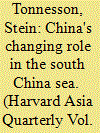

|
|
|
| 2 |
ID:
117757
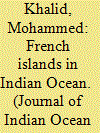

|
|
|
| 3 |
ID:
148646
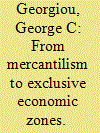

|
|
|
|
|
| Summary/Abstract |
This essay traces the transfer of private ownership of economic resources from sovereign rulers to the modern nation-state, starting with mercantilism and ending with exclusive economic zones. Nation-states were initially envisaged as bodies that acted on behalf of their citizens, but over time they have become distant from democratic processes as they have sought to claim property rights over more and more of the planet, and now of outer space. Consequently, what remains of the global commons is on the verge of extinction. This essay examines whose interests such activities serve and the resulting implications.
|
|
|
|
|
|
|
|
|
|
|
|
|
|
|
|
| 4 |
ID:
109091
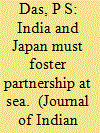

|
|
|
| 5 |
ID:
139596
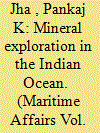

|
|
|
|
|
| Summary/Abstract |
India's lack of a concrete policy towards exploration for mineral resources in high seas and offshore areas has played a role, though to a limited extent, in the exploration projects being awarded to countries like Korea and China in the Indian Ocean. In 2011, China was awarded a large area in the Indian Ocean for mineral exploration. India has thence awakened to the issue and has made amends to its bureaucratic inertia. However, the question is whether these mineral exploration projects and demarcated ocean areas have economic implications only, or have larger strategic significance. In the contemporary debates, the ocean economy is gaining traction with more and more littoral nations seeking to generate revenue as well as royalty from ocean resources. This paper therefore attempts to address the issues of ocean economy, mineral exploration, exclusive economic zones (EEZ), interests of small island nations, and how these issues have a larger strategic implication.
|
|
|
|
|
|
|
|
|
|
|
|
|
|
|
|
| 6 |
ID:
127026
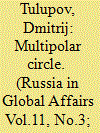

|
|
|
|
|
| Publication |
2013.
|
| Summary/Abstract |
International cooperation in the Arctic has been expanding steadily since the start of the 21st century, assuming systemic outlines over a relatively short period of time (from 2006 till 2013), as evidenced by a series of development concepts approved by the interested countries for their respective regions. The review of these documents indicates that most of the key tasks lie in the foreign policy field, with Arctic diplomacy playing a major role in their implementation. Unique geographical and climatic features make the Arctic truly international. The Arctic Ocean is a center of gravity for polar and off-polar nations. Dividing lines here are less noticeable than on land, but this does not detract from their legal significance. More often than not, resources within the exclusive economic zones of the five littoral states are transboundary in nature and their development (e.g., Shtokman field, Yamal LNG) requires the creation of international consortiums. Apart from cooperation, the Arctic states also have to coordinate their mutual interests and regulate disputes. All these aspects in their entirety form the thematic area within which Arctic diplomacy is used
|
|
|
|
|
|
|
|
|
|
|
|
|
|
|
|
| 7 |
ID:
148501
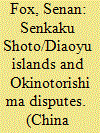

|
|
|
|
|
| Summary/Abstract |
The Senkaku Shoto/Diaoyu Islands dispute in the East China Sea and the Okinotorishima dispute in the western Pacific are currently among the most prominent maritime disagreements between Japan and China. Both disputes are influenced by neorealist strategic and material interests in relation to sea lines of communication, the demarcation of maritime territory, exclusive economic zones (EEZs), and continental shelf claims. Despite material similarities, it is the issue of the rightful ownership of the historically sensitive Senkaku Shoto/Diaoyu Islands that has seriously strained bilateral relations. The way that the disagreements manifest themselves arguably reflects the central role that such liberal and constructivist themes as emotion, identity, nationalism, and domestic politics play in the dispute. The Senkaku Shoto/Diaoyu Islands dispute in particular is one where domestic politics and ideational influences play a disproportionately strong role in escalating tensions and complicating attempts at resolution. This article aims to examine the shared and contrasting ideational and material aspects of these two disputes, and to show how these interests shape Japan’s and China’s respective approaches in both cases. It thus sheds some light on when and why Sino-Japanese ideational and material interests intersect and how they affect bilateral relations.
|
|
|
|
|
|
|
|
|
|
|
|
|
|
|
|
| 8 |
ID:
118489
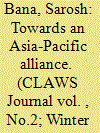

|
|
|
| 9 |
ID:
125892
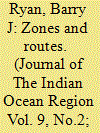

|
|
|
|
|
| Publication |
2013.
|
| Summary/Abstract |
This paper examines power relations along the African coast of the Indian Ocean in terms of space and time. Spatial strategies, it argues, are swiftly emerging through zoning mechanisms which territorialise the governance of ocean space. These strategies can supplement and disrupt more traditional temporal strategies, which facilitate speed and freedom of movement for commercial and military traffic. The article focusses on the US proposition to provide maritime security sector reform to African coastal states as a form of temporal strategy designed to shape new zoning practices in favour of freedom of movement. The paper concludes by arguing that the US strategy implies a policing approach that generates maritime surveillance capacities along land-sea lanes of communication. It contrasts this surface form of knowledge with the need for African coastal states to generate the sort of oceanographic data presently undergirding the emerging blue economies of Europe.
|
|
|
|
|
|
|
|
|
|
|
|
|
|
|
|